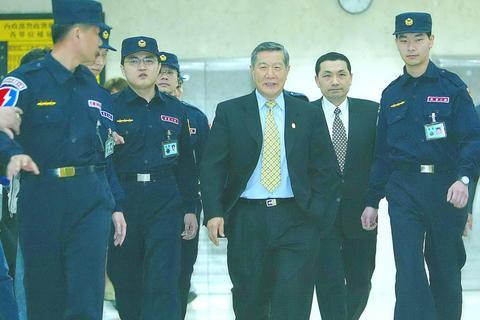Following a meeting with President Chen Shui-bian (陳水扁) at the Presidential Office yesterday morning, the US-based forensic specialist Dr. Henry Lee (
"Our conversation lasted for half an hour and I confirmed that he got a fresh wound on his stomach and the wound was caused by a gunshot," Lee said at a press conference at the National Police Administration's Criminal Investigation Bureau (CIB) yesterday afternoon.

PHOTO: CNA
Lee said that he spent almost all day yesterday in the bureau's laboratory, inspecting, reviewing and examining the evidence collected by CIB officers. He established that the jacket Chen wore during the shooting incident bore no sign of gunshot residue.
"The reasons why there was no explosive reaction on his clothes could be various, and I would not presume [to guess] at this moment," Lee said.
During his conversations with reporters, the retired commissioner of Connecticut's Department of Public Safety emphasized again that he would not lead the investigation of the case.
"I only came back to provide forensic analysis to assist local investigators. That is all," said Lee, who grew up in Taiwan.
In response to questions about the latest developments in the investigation, Lee said he could not make more facts public due to a gag order.
When asked whether he has been working on the case under any political pressure and how much he was paid to do the job, Lee said that pressure cannot be avoided. He said he was conducting his investigation for free, because he simply wants to help.
"I am not involved in any political tug of war while I am doing this," Lee said.
He said that he had cancelled two speaking engagements in the US to come to Taiwan.
"That was US$5,000 for each speech," Lee said with a smile.
He then turned to CIB Commissioner Hou You-yi (
After the 15-minute press conference, Lee flew to Tainan to conduct further research.
Accompanied by his aide Dr. Jacob Loke, retired West Valley police officer Charles Illsley, forensic photographer Calvin Ostler and Connecticut lawyer Austin McGuigan, Lee arrived in Taiwan at 5am to begin his forensic analysis of the assassination attempt on Chen and Vice President Annette Lu (
They brought along a state-of-the-art device called an "Ultralight" to help analyze potential evidence that might have been missed.
The Ultralight was invented by Illsley and Ostler. According to Illsley, it uses a special light source to illuminate trace elements and other chemical properties that are invisible to the human eye. Remains of blood stains can be detected on a wall, even under a coat of paint. Subcutaneous bruises, bite marks, residue from drugs or firearms, bodily fluids, bone fragments and even inks that have been washed away with acetone can also be detected.

MAKING WAVES: China’s maritime militia could become a nontraditional threat in war, clogging up shipping lanes to prevent US or Japanese intervention, a report said About 1,900 Chinese ships flying flags of convenience and fishing vessels that participated in China’s military exercises around Taiwan last month and in January last year have been listed for monitoring, Coast Guard Administration (CGA) Deputy Director-General Hsieh Ching-chin (謝慶欽) said yesterday. Following amendments to the Commercial Port Act (商港法) and the Law of Ships (船舶法) last month, the CGA can designate possible berthing areas or deny ports of call for vessels suspected of loitering around areas where undersea cables can be accessed, Oceans Affairs Council Minister Kuan Bi-ling (管碧玲) said. The list of suspected ships, originally 300, had risen to about

DAREDEVIL: Honnold said it had always been a dream of his to climb Taipei 101, while a Netflix producer said the skyscraper was ‘a real icon of this country’ US climber Alex Honnold yesterday took on Taiwan’s tallest building, becoming the first person to scale Taipei 101 without a rope, harness or safety net. Hundreds of spectators gathered at the base of the 101-story skyscraper to watch Honnold, 40, embark on his daredevil feat, which was also broadcast live on Netflix. Dressed in a red T-shirt and yellow custom-made climbing shoes, Honnold swiftly moved up the southeast face of the glass and steel building. At one point, he stepped onto a platform midway up to wave down at fans and onlookers who were taking photos. People watching from inside

Japan’s strategic alliance with the US would collapse if Tokyo were to turn away from a conflict in Taiwan, Japanese Prime Minister Sanae Takaichi said yesterday, but distanced herself from previous comments that suggested a possible military response in such an event. Takaichi expressed her latest views on a nationally broadcast TV program late on Monday, where an opposition party leader criticized her for igniting tensions with China with the earlier remarks. Ties between Japan and China have sunk to the worst level in years after Takaichi said in November that a hypothetical Chinese attack on Taiwan could bring about a Japanese

The WHO ignored early COVID-19 warnings from Taiwan, US Deputy Secretary of Health and Human Services Jim O’Neill said on Friday, as part of justification for Washington withdrawing from the global health body. US Secretary of State Marco Rubio on Thursday said that the US was pulling out of the UN agency, as it failed to fulfill its responsibilities during the COVID-19 pandemic. The WHO “ignored early COVID warnings from Taiwan in 2019 by pretending Taiwan did not exist, O’Neill wrote on X on Friday, Taiwan time. “It ignored rigorous science and promoted lockdowns.” The US will “continue international coordination on infectious